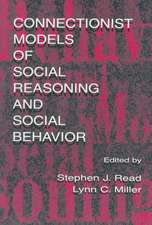Computational Social Psychology: Frontiers of Social Psychology
Editat de Robin R. Vallacher, Stephen J. Read, Andrzej Nowaken Limba Engleză Hardback – iun 2017
The book brings together social psychologists with varying topical interests who are taking the lead in this redirection of the field. Many present formal models that are implemented in computer simulations to test basic assumptions and investigate the emergence of higher-order properties; others develop models to fit the real-time evolution of people’s inner states, overt behavior, and social interactions. Collectively, the contributions illustrate how the methods and tools of the computational approach can investigate, and transform, the diverse landscape of social psychology.
| Toate formatele și edițiile | Preț | Express |
|---|---|---|
| Paperback (1) | 473.46 lei 6-8 săpt. | |
| Taylor & Francis – 5 iun 2017 | 473.46 lei 6-8 săpt. | |
| Hardback (1) | 1117.07 lei 6-8 săpt. | |
| Taylor & Francis – iun 2017 | 1117.07 lei 6-8 săpt. |
Din seria Frontiers of Social Psychology
-
 Preț: 366.03 lei
Preț: 366.03 lei -
 Preț: 402.59 lei
Preț: 402.59 lei - 15%
 Preț: 460.20 lei
Preț: 460.20 lei - 8%
 Preț: 384.45 lei
Preț: 384.45 lei - 9%
 Preț: 1005.50 lei
Preț: 1005.50 lei - 12%
 Preț: 299.52 lei
Preț: 299.52 lei -
 Preț: 492.20 lei
Preț: 492.20 lei -
 Preț: 435.59 lei
Preț: 435.59 lei -
 Preț: 487.16 lei
Preț: 487.16 lei -
 Preț: 468.36 lei
Preț: 468.36 lei -
 Preț: 478.98 lei
Preț: 478.98 lei -
 Preț: 495.62 lei
Preț: 495.62 lei -
 Preț: 448.49 lei
Preț: 448.49 lei -
 Preț: 435.59 lei
Preț: 435.59 lei -
 Preț: 496.01 lei
Preț: 496.01 lei - 31%
 Preț: 765.77 lei
Preț: 765.77 lei - 15%
 Preț: 470.85 lei
Preț: 470.85 lei -
 Preț: 482.62 lei
Preț: 482.62 lei - 15%
 Preț: 459.43 lei
Preț: 459.43 lei - 30%
 Preț: 770.98 lei
Preț: 770.98 lei - 16%
 Preț: 351.26 lei
Preț: 351.26 lei - 15%
 Preț: 459.09 lei
Preț: 459.09 lei - 30%
 Preț: 772.79 lei
Preț: 772.79 lei - 15%
 Preț: 488.43 lei
Preț: 488.43 lei -
 Preț: 491.21 lei
Preț: 491.21 lei -
 Preț: 490.25 lei
Preț: 490.25 lei - 18%
 Preț: 1115.51 lei
Preț: 1115.51 lei -
 Preț: 477.82 lei
Preț: 477.82 lei
Preț: 1117.07 lei
Preț vechi: 1362.29 lei
-18% Nou
Puncte Express: 1676
Preț estimativ în valută:
213.82€ • 232.33$ • 179.72£
213.82€ • 232.33$ • 179.72£
Carte tipărită la comandă
Livrare economică 22 aprilie-06 mai
Preluare comenzi: 021 569.72.76
Specificații
ISBN-13: 9781138951648
ISBN-10: 1138951641
Pagini: 398
Ilustrații: 69
Dimensiuni: 152 x 229 x 22 mm
Greutate: 0.68 kg
Ediția:1
Editura: Taylor & Francis
Colecția Routledge
Seria Frontiers of Social Psychology
Locul publicării:Oxford, United Kingdom
ISBN-10: 1138951641
Pagini: 398
Ilustrații: 69
Dimensiuni: 152 x 229 x 22 mm
Greutate: 0.68 kg
Ediția:1
Editura: Taylor & Francis
Colecția Routledge
Seria Frontiers of Social Psychology
Locul publicării:Oxford, United Kingdom
Cuprins
Preface. Overview. 1. Rethinking Human Experience: The Promise of Computational Social Psychology Robin R. Vallacher, Andrzej Nowak, and Stephen J. Read I. Intrapersonal Dynamics 2. Virtual Personalities: A Neural Network Model of the Structure and Dynamics of Personality Stephen J. Read, Vita Droutman, and Lynn C. Miller 3. Using Connectionist Models to Capture the Distinctive Psychological Structure of Impression Formation Brian M. Monroe, Tei Laine, Swati Gupta, and Ilya Farber 4. The Whole Elephant: Toward Psychological Integration of the Individual as a Complex System Jennifer Rose Talevich 5. Computational Modeling of Health Behavior Mark G. Orr and Daniel Chen II. Interpersonal Dynamics 6. Interaction Dominant Dynamics, Timescale Enslavement, and the Emergence of Social Behavior Brian A. Eiler, Rachel W. Kallen, and Michael J. Richardson 7. Computational Temporal Interpersonal Emotion Systems Emily A. Butler, Jinyan Guan, Andrew Predoehl, Ernesto Brau, Kyle Simek, and Kobus Barnard 8. Mapping Co-Regulation in Social Relations through Exploratory Topology Analysis Jonathan E. Butner, Arwen A. Behrends, and Brian R. Baucom 9. Dynamics of Synchrony and Joint Action Kerry L. Marsh 10. From Interaction to Synchronization in Social Relations Robin R. Vallacher and Andrzej Nowak III. Collective Dynamics 11. Simulating the Social Networks in Human Goal Striving James D. Westaby and DaHee Shon 12. Computational Models of Social Influence and Collective Behavior Robert J. MacCoun 13. Modeling Cultural Dynamics Yoshihisa Kashima, Michael Kirley, Alexander Stivala, and Garry Robins 14. Models Are Stupid, and We Need More of Them Paul E. Smaldino 15. Big Data in Psychological Research David Serfass, Andrzej Nowak, and Ryne Sherman 16. The Future of Computational Social Psychology Andrzej Nowak and Robin R. Vallacher
Notă biografică
Robin R. Vallacher is professor of Psychology at Florida Atlantic University, a Research Associate in the Center for Complex Systems, University of Warsaw, Poland, and a Research Affiliate in the Advanced Consortium on Cooperation, Conflict, and Complexity at Columbia University. He has been a visiting scholar at University of Texas at Austin, University of Bern (Switzerland), Max Planck Institute for Psychological Research (Germany), and University of Montpellier (France). Dr. Vallacher has authored or edited seven professional texts, and has published over 100 book chapters and journal articles on a wide range of topics in social psychology, including self-concept, self-regulation, social judgment, close relationships, prejudice and discrimination, sport psychology, social justice, and intergroup conflict. In recent years, he and his colleagues have adapted concepts and methods from the study of nonlinear dynamical systems in the natural sciences to the investigation of personal, interpersonal, and societal processes.
Stephen J. Read is professor of Psychology at the University of Southern California, head of the social psychology area, and a Fellow of the Association for Psychological Science and the Society for Experimental Social Psychology. Dr. Read has edited three books and published over 100 journal articles and book chapters on person perception, causal reasoning, attachment theory, decision-making, use of interactive media (DVD and game) for changing risky sexual behavior, personality, and the neurobiology of risky decision-making. He has developed and published neural network models of person perception, causal reasoning, cognitive dissonance, personality and motivation, and risky decision-making. He has also worked on computational models of personality in intelligent agents and models of the role of narrative representations in military decision-making. Recently, he has focused on integrating work on the neurobiological bases of risky decision-making with neural network models of the neural systems involved in risky decision-making.
Andrzej Nowak is a professor of psychology at Florida Atlantic University, University of Warsaw, Poland, where he directs the Center for Complex Systems, and Warsaw University of Humanities and Social Sciences. He is also a Fellow at the European Center for Living Technologies, and a Research Affiliate in the Advanced Consortium on Cooperation, Conflict, and Complexity at Columbia University. Dr. Nowak has authored or edited 16 professional texts, and has published over 100 book chapters and journal articles on a wide range of topics in social psychology, including social influence, social change, self-concept, self-regulation, social judgment, sport psychology, intergroup conflict, and psychological aspects of new media. Working with his colleagues, he has adapted concepts and methods from the study of complex systems and nonlinear dynamics in the natural sciences to the investigation of personal, interpersonal, and societal processes. He publishes in psychology, physics, and interdisciplinary journals.
Stephen J. Read is professor of Psychology at the University of Southern California, head of the social psychology area, and a Fellow of the Association for Psychological Science and the Society for Experimental Social Psychology. Dr. Read has edited three books and published over 100 journal articles and book chapters on person perception, causal reasoning, attachment theory, decision-making, use of interactive media (DVD and game) for changing risky sexual behavior, personality, and the neurobiology of risky decision-making. He has developed and published neural network models of person perception, causal reasoning, cognitive dissonance, personality and motivation, and risky decision-making. He has also worked on computational models of personality in intelligent agents and models of the role of narrative representations in military decision-making. Recently, he has focused on integrating work on the neurobiological bases of risky decision-making with neural network models of the neural systems involved in risky decision-making.
Andrzej Nowak is a professor of psychology at Florida Atlantic University, University of Warsaw, Poland, where he directs the Center for Complex Systems, and Warsaw University of Humanities and Social Sciences. He is also a Fellow at the European Center for Living Technologies, and a Research Affiliate in the Advanced Consortium on Cooperation, Conflict, and Complexity at Columbia University. Dr. Nowak has authored or edited 16 professional texts, and has published over 100 book chapters and journal articles on a wide range of topics in social psychology, including social influence, social change, self-concept, self-regulation, social judgment, sport psychology, intergroup conflict, and psychological aspects of new media. Working with his colleagues, he has adapted concepts and methods from the study of complex systems and nonlinear dynamics in the natural sciences to the investigation of personal, interpersonal, and societal processes. He publishes in psychology, physics, and interdisciplinary journals.
Recenzii
'Computational Social Psychology is a scientific gem. In a world of constant change, we desperately need new theoretical models and tools to understand the complexity of human dynamics. This volume, edited by the world’s best dynamical social psychologists, with chapters from global experts on topics that span different levels of analysis, promises to change the way we think about—and study—human behavior.' - Michele J. Gelfand, University of Maryland, USA
'Our Big Data era demands Big Theory – theory acknowledging the core insight of social psychology, that human behavior flows from interactions among networks of individuals, dynamically influencing each other. As this volume argues, adequately complex theories require computational implementation, not vague verbal statements; unaided intuition cannot derive precise predictions.' - Eliot Smith, Indiana University, USA
'Computational modelling is an increasingly important way of doing science, and in some disciplines it has become the dominant method to understand the world. This important book shows how computational models can contribute to advances in social psychology that respect the complexity of human interactions.' - Nigel Gilbert, University of Surrey, UK
'Computational Social Psychology is a volume the field has been waiting for. It provides a launchpad for new theoretical approaches that can cope with the complexity of social reasoning and interpersonal behavior.' - Keith J. Holyoak, University of California, Los Angeles, USA
'I hope this book will serve as a pillar in further bridging the divide between computational scientists and social psychologists. Considering the challenges we face in modelling human behaviour in a valid way to deepen our understanding of many societal challenges, it is relevant to develop sound social psychological computational models. As such, I recommend this book as an important reference book for modellers to keep updated on the latest developments in the computational modelling of human behaviour.' - Wander Jager, Journal of Artificial Societies and Social Simulation:
'Our Big Data era demands Big Theory – theory acknowledging the core insight of social psychology, that human behavior flows from interactions among networks of individuals, dynamically influencing each other. As this volume argues, adequately complex theories require computational implementation, not vague verbal statements; unaided intuition cannot derive precise predictions.' - Eliot Smith, Indiana University, USA
'Computational modelling is an increasingly important way of doing science, and in some disciplines it has become the dominant method to understand the world. This important book shows how computational models can contribute to advances in social psychology that respect the complexity of human interactions.' - Nigel Gilbert, University of Surrey, UK
'Computational Social Psychology is a volume the field has been waiting for. It provides a launchpad for new theoretical approaches that can cope with the complexity of social reasoning and interpersonal behavior.' - Keith J. Holyoak, University of California, Los Angeles, USA
'I hope this book will serve as a pillar in further bridging the divide between computational scientists and social psychologists. Considering the challenges we face in modelling human behaviour in a valid way to deepen our understanding of many societal challenges, it is relevant to develop sound social psychological computational models. As such, I recommend this book as an important reference book for modellers to keep updated on the latest developments in the computational modelling of human behaviour.' - Wander Jager, Journal of Artificial Societies and Social Simulation:
Descriere
Computational Social Psychology showcases a new approach to social psychology that enables theorists and researchers to implemented and test models of processes using the power of high speed computing technology and sophisticated software.



















